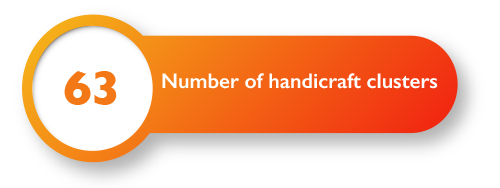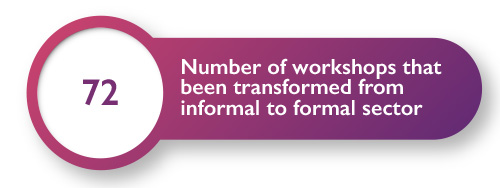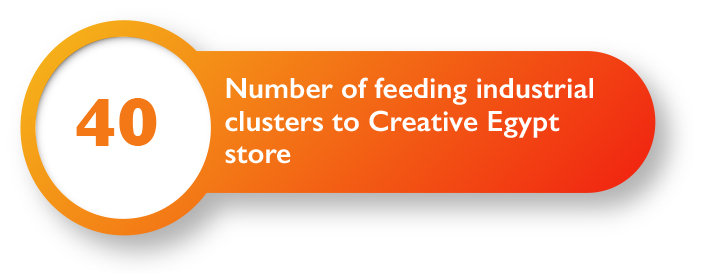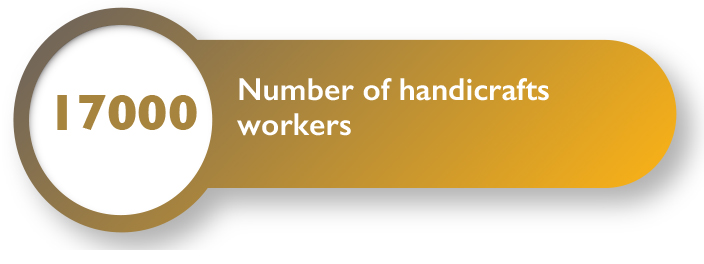
Background
Cluster-based industrial development is considered as a main pillar in Egypt’s Sustainable Development Strategy and vision 2030. Clusters are found to boost intra-organizational growth, improve efficiency and profits among affiliate businesses, and support micro and small entrepreneurs to avoid development limitations and compete in an ambitious marketplaces. That’s why IMC gives great attention to industrial and creative clusters through the sustainable development component (SD). SD aims at developing and supporting small and micro enterprises in the industrial, handicraft, and service related to industry sectors so that they can compete in the local and global markets by upgrading their capacities and strengthening their value chains.
The Sustainable Development Program works through three key programs focusing on three industrial categories as follows:
- Creative Clusters Development Program (CCDP)
- Creative Egypt Program (CEP)
- National Small Projects Program (NSPP)
Creative Clusters Development Program (CCDP)

The Creative Clusters Development Program is a seamless program in terms of paying attention to handicrafts and micro-enterprises; where artisans produces innovative works reflecting Egyptian identity in a comprehensive development methodology that helps them do their work in a good environment.
The program was launched in July 2005 with a vision to support small handicraft clusters in a focused geographical area, and producing similar products. IMC since then continued to incorporate the largest number possible of small workshops and micro-enterprises’ owners into a framework of support and services of which IMC bears approximately 90% of the total cost. The Program has also contributed to save many extinct crafts, as well as availing the opportunity for them to exhibit their products in a large number of local and international fairs, in addition to marketing opportunities.
Program goals
- Develop and support micro-enterprises as well as helping them survive and sustain their operations under global competition.
- Revive and maintain traditional crafts, and develop designs in such a way to keep pace with global designs
Program services
- Knowledge transfer and provision of technical assistance as well as building production capacity
- Design, quality and technical development
- Upgrading administrative skills
- Export promotion and product marketing support via “Creative Egypt” window
The Program in figures






Creative Egypt Program
The Handicraft Clusters’ success in integrating a large number of handicraft micro and small enterprises owners had a remarkable impact on taking the Program further from the integration and development phase to the establishment of a permanent platform for exhibiting Egyptian handicrafts and helping their owners promote their works under a governmental umbrella. This has resulted in the foundation of “Creative Egypt” as the first registered trademark for handicrafts. It further helps business owners in international fairs.
Since then, IMC has ensured a permanent premises for exhibiting designers’ products of various types. The Program utilized “Omar Effendi” facility in Mohandsein as a premises for exhibiting handicrafts for three years,, then moved to the “Cairo Festival Mall” to host a permanent platform with a larger area, to secure a more enhanced exhibition facility and to provide job opportunities for several families. This location also ensures profit sustainability and work within an innovative-stimulating environment.
Program goals
- Developing traditional industries for craft clusters and entrepreneurs with creative projects
- Supporting these crafts and small industries and providing the appropriate environment for their growth, including the development of internal and external markets for their products and linking them to global supply chains
- Achieving sustainable development for this sector and providing an enabling environment to support priority crafts and industries.
Creative Egypt Eligibility Criteria
- An NGO establishment Decree and its executive regulations (NGOs only)
- Commercial registry and a recent tax card (companies only)
- Membership ID of Fine Arts Syndicate (Designers and Art men only)
- Fulfilment of exhibition conditions by the Evaluation and Quality Committee (All)
- Cluster acceptance following a field visit to assess growth potentials (All)
Creative Egypt Services
The Program offers technical assistance and marketing services to handicrafts and designers as follows:
- Technology transfer and capacity building
- New designs in line with international and local markets requirements
- Product quality development and improvement
- Export promotion and marketing support services
- Technical and technological training
- Managerial skills training services
- Local exhibitions for marketing
- E-commerce platform
- Professional Photography for the products.
- Social media marketing
Program Figures






Small and Micro National Enterprises Program
National Small Projects Program
The Program is divided into two key sectors as follows:
- Services related to industry companies
- Industrial clusters
Services related to Industry companies Sector
In addition to the IMC role in supporting the industrial sector, it has developed a special program for the industry-supporting companies, such as shipping, transportation, marketing, export and marketing companies, which contribute directly and indirectly to the development of the industrial sector and increase its competitiveness and improving work environment.
The Program provides a group of high-impact services that enable companies supporting industry in the private sector to grow and contribute positively to serving the industrial sector, the Egyptian national economy and international trade.
Beneficiary companies
- Shipping, transport and logistics sector
- Export and export marketing sector
- Internal marketing and distribution sector
Registration criteria for companies
First: Shipping, transport and logistics companies
- A duly established company in Egypt
- Entirely private sector company, or majority of shares privately held
- Has at least three years of experience in the filed
- Registered at the Commercial Registry Office with a valid tax card
Second: Export and export marketing companies
- An established company in Egypt
- Entirely private sector company, or majority of shares privately held
- Has at least three years of experience in the filed
- Registered at the Commercial Registry Office with a valid tax card
- Representing at least 3 industrial establishments, with a volume of exports from one or more Egyptian product over a year not less than one million pounds. At all times, the company should provide IMC with supporting documents in this regard.
Third: Internal marketing and distribution companies
- A duly established company in Egypt
- Entirely private sector company, or majority of shares privately held
- Has at least three years experience in the filed
- An authorized distributor or trade agent for one industrial establishment at least
- Registered at the Commercial Registry Office with a valid tax card
Industrial Clusters Program
The industrial clusters program began in 2014 based on IMC vision to search for industrial groups most in need of support. Therefore, IMC gave priority to small and micro industrial enterprises under business associations, with a view to ‘formalizing’ these units through a group of services focusing on technical support and training, whether for business associations, or for productive units operating under the umbrella of those associations. The Program also contributes to helping industrial clusters build their competitiveness and improve the quality of final products and thus access to export markets. This is in addition to quality improvement and technical and technological training by consultants and specialists in various fields, and assistance in marketing of finished products.
Business Associations’ registration criteria at IMC
- A company should be registered at an NGO or Cooperative registered at the Ministry of Social Solidarity or Cooperative Union
- With a productive activity for similar or integrating products
- With a not less than 3 workshops per cluster
- Cluster members will cooperate with the Program through the Business Association, which certifies business owners as their members. All services are collectively delivered.
Industrial Clusters’ scope of work
Work with small and micro enterprises with activities in various industrial sectors under business associations.
Program services:
- Management
- Quality
- Information Technology
- Financial Management
- Marketing
- Training
- Export promotion



